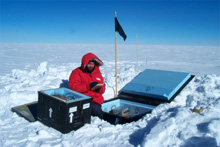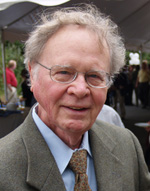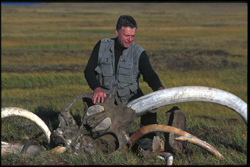

Lectures
Lectures
2007 New York City International Polar Weekend offered the following lectures
The Arctic, Papa Franz Boas, and the Birth of Modern Anthropological Theory by David Hurst Thomas, AMNH
Franz Boas, a curator at the American Museum of Natural History, has been universally hailed as the Father of American Anthropology. Boas conducted ethnographic fieldwork in the Arctic over a 15 year period, using his first-hand observations as the basis for his theories. He strongly rejected the notion that Inuit people were "living fossils," direct descendants from the ancient hunters of the European Ice Age. It was through the debates that followed that Boas built upon his Arctic experiences to redefine the discipline we now call anthropology.
Polar Exploration: IPYs, Explorers Club, Women Polar Explorers by Clare Flemming, Explorers Club and Milbry Polk, Wings World Quest
Hear how some of New York's intrepid explorers ventured into remote areas and learned to adapt to the extreme cold and year-round ice in times when exploration was much more dangerous and unforgiving.
Large Subglacial Lakes in Abtarctica by Michael Studinger, LDEO In the heart of the Antarctic continent, but Buried under several miles of ice, are subglacial lakes ranging in size from Lake Vostok, a body the size of Lake Ontario, to features the size of Manhattan. These hidden lakes number over 145, suggesting that some of them have been covered by the vast Antarctic ice sheet for up to 25 million years. Emerging scientific evidence from studies of the overlying ice sheet indicates that unique life-supporting ecosystems may be locked within these subglacial environments. |
 |
|---|
The North Pole Was Here: The Once and Future Arctic and The New York Times by Andy Revkin, New York Times Science Writer
The Arctic and climate change have been a source of journalistic discussion by The New York Times almost ever since the paper was born in 1851. Andrew Revkin has recently completed three assignments north of the Arctic Circle, including a trip to the shifting sea ice at the North Pole itself with a hardy climate-research team. Andy will provide a tour of the past and future Arctic through the now-digital archives.
Global Warming: The Role of the Ocean; Day After Tomorrow: The Role of the media? by Wally Broecker, Columbia/LDEO, Allison Hannon, The Climate Group Wally Broecker pioneered research on the role of the ocean conveyor belt in climate. How does the reality of abrupt climate change intersect with the‘science’ myths in the movie “The Day After Tomorrow” and the realities of climate change. |
 |
|---|
Mystery of the Open Polar Sea by Michael Robinson, University of Hartford
In 1845 the apparent vanishing of British explorer Sir John Franklin and his full party of 129 men as they travelled the Arctic set back in motion the theory of the open Polar Sea. The party’s disappearance was a set back to the British Admiralty and its efforts to discover the Northwest Passage, yet finding Franklin became the new object of Arctic exploration, launching dozens of rescue expeditions on both sides of the Atlantic. The open Polar Sea theory’s appeal included not only by wild-eyed optimists and enthusiasts of the Franklin search, but also serious scientists who felt that it offered the key to a climate model of the world.
A picture is worth a thousand graphs: The psychology of environmental decision making by Sabine Marx, CRED, Columbia
How do humans respond to climate change and climate variability? How can we improve communication and use of scientific information on climate by managers and decision-makers?.The Center for Research on Environmental Decisions is an interdisciplinary center studying individual and group decision making under climate uncertainty, and decision making in the face of environmental risk.
Ice-Age Mammal Extinctions: Who or What, and When and Why? by Ross MacPhee Ice-Age Extinctions – who and what were lost and what were the triggers for these occurrences. |
 |
|---|